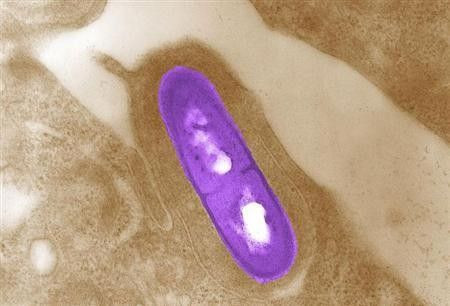Multi-State Listeria Outbreak Causes 1 Death, 1 'Fetal Loss'; CDC Investigates Possible Florida Link
KEY POINTS
- Most of the patients had to be hospitalized
- It is suspected that they got sick from the same food
- However, a common food item hasn't been identified
A Listeria outbreak has caused nearly two dozen illnesses, with most of the patients living in or having traveled to Florida. One person died while a pregnant patient experienced "fetal loss."
A total of 23 people have been infected with the Listeria monocytogenes outbreak strain as of Wednesday, according to the U.S. Centers for Disease Control and Prevention (CDC).
The illnesses were reported from 10 states. Twelve of the cases were reported in Florida, while eight of the patients who did not live in Florida also reported traveling to the state in the month before they got sick.
That said, "the significance of this is still under investigation," the CDC noted.
Twenty-two (96%) of the patients had to be hospitalized, with one death reported from Illinois. Five of the patients also fell ill during their pregnancy. One of them experienced a "fetal loss."
As the CDC explained, pregnant people and their newborns, older adults and those who have weakened immune systems are most at risk of getting sick with Listeria. In pregnant people, it may result in miscarriage, stillbirth or premature delivery even though the illness itself may only be mild. Their newborns may also experience a "life-threatening infection."
While other people can be infected with Listeria as well, they "rarely become seriously ill."
"The true number of sick people in an outbreak is likely higher than the number reported, and the outbreak may not be limited to the states with known illnesses," the CDC explained. "In addition, recent illnesses may not yet be reported as it usually takes 3 to 4 weeks to determine if a sick person is part of an outbreak."
Results of whole-genome sequencing suggest that the patients "likely got sick from the same food." Authorities are still conducting investigations and interviews to determine what the patients may have eaten before they got sick.
"So far, a common food item has not been identified," the CDC said.
NEW Listeria outbreak: 23 people sick, 20 of them live in or traveled to Florida before they got sick. No food linked to outbreak yet. CDC will provide new info as investigation progresses. https://t.co/1ygHQJ8aJ1 pic.twitter.com/F2wrbGR6En
— CDC (@CDCgov) June 30, 2022
As such, the agency is urging anyone who may have symptoms of Listeria to list the foods they remember eating in the month before they got sick to help "solve the outbreak."
Symptoms of Listeriosis may be flu-like in pregnant people. In those who aren't pregnant, the symptoms may include headache, fever, stiff neck, convulsions, loss of balance, confusion and muscle aches. They may also experience food poisoning symptoms such as diarrhea.
According to the CDC, symptoms of "severe illness" typically begin about two weeks after eating the contaminated food. But there are also cases in which the symptoms are reported "as early as the same day or as late as 70 days after."
"If you are at higher risk for Listeria infection and have symptoms, especially if you recently traveled to Florida, talk to your healthcare provider," the CDC noted.

© Copyright IBTimes 2024. All rights reserved.






















